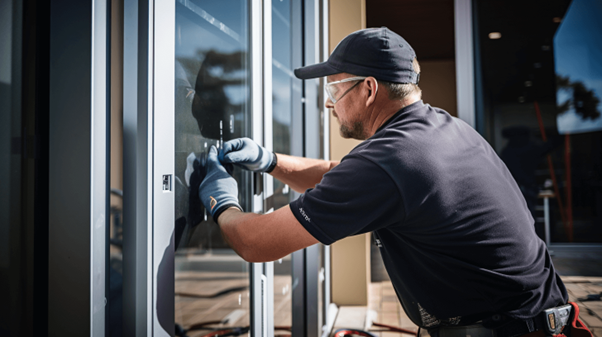A commercial door is more than an entry point; it’s a critical part of workplace safety and security. Over time, doors endure heavy use, and the closers that control their movement can wear out. Knowing when to schedule a commercial door closer replacement ensures safety, prevents damage, and maintains smooth operation.
Why Door Closers Are Important
Door closers regulate how a door opens and closes. Without proper functioning, doors can slam, stick, or fail to latch. For businesses, this can lead to security risks, safety hazards, and unnecessary wear on other commercial door hardware. Regular inspection and timely replacement are key to avoiding costly problems.
Key Signs You Need a Commercial Door Closer Replacement
Recognising early warning signs can save time and money. Here are the most common indicators that your door closer is failing:
1. Doors Slam Shut or Don’t Close Properly
If your door swings shut too quickly or doesn’t close completely, the closer may have lost hydraulic fluid, or the spring tension may be worn.
- Risk of injury to employees and customers increases.
- Door damage may occur over time.
- Security can be compromised if doors fail to latch.
2. Unusual Noises During Operation
Squeaks, grinding, or banging noises often signal internal issues.
- Hydraulic fluid leaks can lead to uneven movement.
- Worn-out internal parts may affect the door’s timing.
- Regular checks of commercial door hardware can detect these early.
3. Visible Leaks or Rust
Hydraulic closers rely on fluid to function smoothly. Signs of leaks or corrosion indicate immediate attention.
- Leaks reduce the door closer’s efficiency.
- Rust can weaken components and shorten lifespan.
- Ignoring these signs can lead to total closure failure.
4. Difficulty Adjusting Door Speed
A door that suddenly moves too fast or too slow despite adjustments may need replacement.
- Existing closer may be incompatible with the current door weight or usage.
- Adjustment screws might no longer function correctly.
- This is a common reason businesses schedule commercial door closer replacement.
5. Wear and Tear from High Traffic
Heavy traffic can strain any door closer, especially in retail or office environments.
- Constant use accelerates spring and hydraulic wear.
- Misaligned doors may damage frames and hinges.
- Scheduled replacement ensures smooth, reliable operation.
Preventive Measures and Maintenance Tips
Proper maintenance extends the life of your closers and other commercial door hardware.
- Inspect closers monthly for leaks or loose screws.
- Clean debris and dust that may affect moving parts.
- Lubricate hinges and check for uneven wear.
- Document signs of wear to anticipate replacement needs.
Benefits of Timely Commercial Door Closer Replacement
Replacing a door closer before it fails offers multiple advantages:
- Enhanced safety for employees and customers.
- Reduced risk of damage to doors, frames, and locks.
- Improved energy efficiency by ensuring doors close properly.
- Consistent operation reduces stress on other commercial door hardware.
Professional Assessment Matters
Hiring a professional to evaluate your door closers ensures the correct solution. Professionals check:
- Door weight and traffic patterns.
- Compatibility with existing hardware.
- Hydraulic function and spring tension.
A proper replacement guarantees long-lasting performance and avoids recurring issues.
Conclusion
Ignoring failing doors can compromise safety, security, and functionality. Knowing the signs of wear and scheduling commercial door closer replacement at the right time protects your business. Regular inspections, timely maintenance, and attention to all commercial door hardware ensure doors operate safely, efficiently, and reliably.









